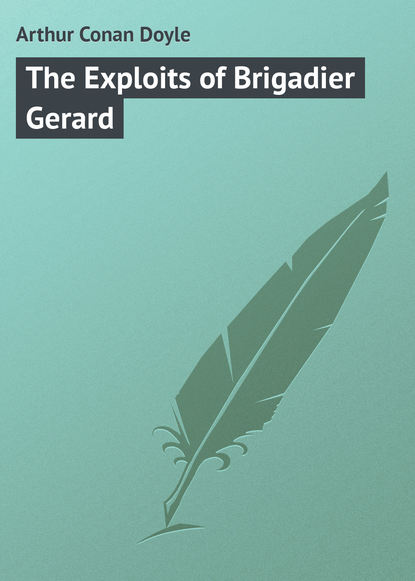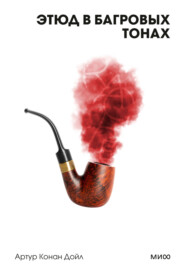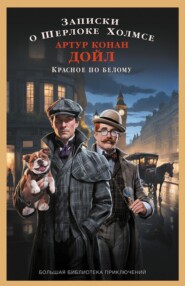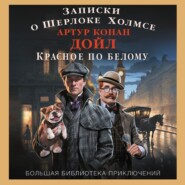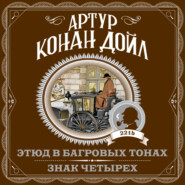По всем вопросам обращайтесь на: info@litportal.ru
(©) 2003-2024.
✖
The Exploits of Brigadier Gerard
Автор
Год написания книги
2014
Настройки чтения
Размер шрифта
Высота строк
Поля
I have said that at the further end of the cellar there was a dim grey fan of light striking downwards from somewhere near the roof. Well, as I peered through the darkness, I suddenly saw a great, tall man skip into this belt of daylight, and then out again into the darkness at the further end. My word, I gave such a start that my shako nearly broke its chin-strap! It was only a glance, but, none the less, I had time to see that the fellow had a hairy Cossack cap on his head, and that he was a great, long-legged, broad-shouldered brigand, with a sabre at his waist. My faith, even Etienne Gerard was a little staggered at being left alone with such a creature in the dark.
But only for a moment. 'Courage!' I thought. 'Am I not a hussar, a brigadier, too, at the age of thirty-one, and the chosen messenger of the Emperor?' After all, this skulker had more cause to be afraid of me than I of him. And then suddenly I understood that he was afraid – horribly afraid. I could read it from his quick step and his bent shoulders as he ran among the barrels, like a rat making for its hole. And, of course, it must have been he who had held the door against me, and not some packing-case or wine-cask as I had imagined. He was the pursued then, and I the pursuer. Aha, I felt my whiskers bristle as I advanced upon him through the darkness! He would find that he had no chicken to deal with, this robber from the North. For the moment I was magnificent.
At first I had feared to light my candle lest I should make a mark of myself, but now, after cracking my shin over a box, and catching my spurs in some canvas, I thought the bolder course the wiser. I lit it, therefore, and then I advanced with long strides, my sword in my hand. 'Come out, you rascal!' I cried. 'Nothing can save you. You will at last meet with your deserts.'
I held my candle high, and presently I caught a glimpse of the man's head staring at me over a barrel. He had a gold chevron on his black cap, and the expression of his face told me in an instant that he was an officer and a man of refinement.
'Monsieur,' he cried, in excellent French, 'I surrender myself on a promise of quarter. But if I do not have your promise, I will then sell my life as dearly as I can.'
'Sir,' said I, 'a Frenchman knows how to treat an unfortunate enemy. Your life is safe.' With that he handed his sword over the top of the barrel, and I bowed with the candle on my heart. 'Whom have I the honour of capturing?' I asked.
'I am the Count Boutkine, of the Emperor's own Don Cossacks,' said he. 'I came out with my troop to reconnoitre Senlis, and as we found no sign of your people we determined to spend the night here.'
'And would it be an indiscretion,' I asked, 'if I were to inquire how you came into the back cellar?'
'Nothing more simple,' said he. 'It was our intention to start at early dawn. Feeling chilled after dressing, I thought that a cup of wine would do me no harm, so I came down to see what I could find. As I was rummaging about, the house was suddenly carried by assault so rapidly that by the time I had climbed the stairs it was all over. It only remained for me to save myself, so I came down here and hid myself in the back cellar, where you have found me.'
I thought of how old Bouvet had behaved under the same conditions, and the tears sprang to my eyes as I contemplated the glory of France. Then I had to consider what I should do next. It was clear that this Russian Count, being in the back cellar while we were in the front one, had not heard the sounds which would have told him that the house was once again in the hands of his own allies. If he should once understand this the tables would be turned, and I should be his prisoner instead of he being mine. What was I to do? I was at my wits' end, when suddenly there came to me an idea so brilliant that I could not but be amazed at my own invention.
'Count Boutkine,' said I, 'I find myself in a most difficult position.'
'And why?' he asked.
'Because I have promised you your life.'
His jaw dropped a little.
'You would not withdraw your promise?' he cried.
'If the worst comes to the worst I can die in your defence,' said I; 'but the difficulties are great.'
'What is it, then?' he asked.
'I will be frank with you,' said I. 'You must know that our fellows, and especially the Poles, are so incensed against the Cossacks that the mere sight of the uniform drives them mad. They precipitate themselves instantly upon the wearer and tear him limb from limb. Even their officers cannot restrain them.'
The Russian grew pale at my words and the way in which I said them.
'But this is terrible,' said he.
'Horrible!' said I. 'If we were to go up together at this moment I cannot promise how far I could protect you.'
'I am in your hands,' he cried. 'What would you suggest that we should do? Would it not be best that I should remain here?'
'That worst of all.'
'And why?'
'Because our fellows will ransack the house presently, and then you would be cut to pieces. No, no, I must go and break it to them. But even then, when once they see that accursed uniform, I do not know what may happen.'
'Should I then take the uniform off?'
'Excellent!' I cried. 'Hold, we have it! You will take your uniform off and put on mine. That will make you sacred to every French soldier.'
'It is not the French I fear so much as the Poles.'
'But my uniform will be a safeguard against either.'
'How can I thank you?' he cried. 'But you – what are you to wear?'
'I will wear yours.'
'And perhaps fall a victim to your generosity?'
'It is my duty to take the risk,' I answered; 'but I have no fears. I will ascend in your uniform. A hundred swords will be turned upon me. "Hold!" I will shout, "I am the Brigadier Gerard!" Then they will see my face. They will know me. And I will tell them about you. Under the shield of these clothes you will be sacred.'
His fingers trembled with eagerness as he tore off his tunic. His boots and breeches were much like my own, so there was no need to change them, but I gave him my hussar jacket, my dolman, my shako, my sword-belt, and my sabre-tasche, while I took in exchange his high sheepskin cap with the gold chevron, his fur-trimmed coat, and his crooked sword. Be it well understood that in changing the tunics I did not forget to change my thrice-precious letter also from my old one to my new.
'With your leave,' said I, 'I shall now bind you to a barrel.'
He made a great fuss over this, but I have learned in my soldiering never to throw away chances, and how could I tell that he might not, when my back was turned, see how the matter really stood, and break in upon my plans? He was leaning against a barrel at the time, so I ran six times round it with a rope, and then tied it with a big knot behind. If he wished to come upstairs he would, at least, have to carry a thousand litres of good French wine for a knapsack. I then shut the door of the back cellar behind me, so that he might not hear what was going forward, and tossing the candle away I ascended the kitchen stair.
There were only about twenty steps, and yet, while I came up them, I seemed to have time to think of everything that I had ever hoped to do. It was the same feeling that I had at Eylau when I lay with my broken leg and saw the horse artillery galloping down upon me. Of course, I knew that if I were taken I should be shot instantly as being disguised within the enemy's lines. Still, it was a glorious death – in the direct service of the Emperor – and I reflected that there could not be less than five lines, and perhaps seven, in the Moniteur about me. Palaret had eight lines, and I am sure that he had not so fine a career.
When I made my way out into the hall, with all the nonchalance in my face and manner that I could assume, the very first thing that I saw was Bouvet's dead body, with his legs drawn up and a broken sword in his hand. I could see by the black smudge that he had been shot at close quarters. I should have wished to salute as I went by, for he was a gallant man, but I feared lest I should be seen, and so I passed on.
The front of the hall was full of Prussian infantry, who were knocking loopholes in the wall, as though they expected that there might be yet another attack. Their officer, a little man, was running about giving directions. They were all too busy to take much notice of me, but another officer, who was standing by the door with a long pipe in his mouth, strode across and clapped me on the shoulder, pointing to the dead bodies of our poor hussars, and saying something which was meant for a jest, for his long beard opened and showed every fang in his head. I laughed heartily also, and said the only Russian words that I knew. I learned them from little Sophie, at Wilna, and they meant: 'If the night is fine we shall meet under the oak tree, but if it rains we shall meet in the byre.' It was all the same to this German, however, and I have no doubt that he gave me credit for saying something very witty indeed, for he roared laughing, and slapped me on my shoulder again. I nodded to him and marched out of the hall-door as coolly as if I were the commandant of the garrison.
There were a hundred horses tethered about outside, most of them belonging to the Poles and hussars. Good little Violette was waiting with the others, and she whinnied when she saw me coming towards her. But I would not mount her. No. I was much too cunning for that. On the contrary, I chose the most shaggy little Cossack horse that I could see, and I sprang upon it with as much assurance as though it had belonged to my father before me. It had a great bag of plunder slung over its neck, and this I laid upon Violette's back, and led her along beside me. Never have you seen such a picture of the Cossack returning from the foray. It was superb.
Well, the town was full of Prussians by this time. They lined the side-walks and pointed me out to each other, saying, as I could judge from their gestures, 'There goes one of those devils of Cossacks. They are the boys for foraging and plunder.'
One or two officers spoke to me with an air of authority, but I shook my head and smiled, and said, 'If the night is fine we shall meet under the oak tree, but if it rains we shall meet in the byre,' at which they shrugged their shoulders and gave the matter up. In this way I worked along until I was beyond the northern outskirt of the town. I could see in the roadway two lancer vedettes with their black and white pennons, and I knew that when I was once past these I should be a free man once more. I made my pony trot, therefore, Violette rubbing her nose against my knee all the time, and looking up at me to ask how she had deserved that this hairy doormat of a creature should be preferred to her. I was not more than a hundred yards from the Uhlans when, suddenly, you can imagine my feelings when I saw a real Cossack coming galloping along the road towards me.
Ah, my friend, you who read this, if you have any heart, you will feel for a man like me, who had gone through so many dangers and trials, only at this very last moment to be confronted with one which appeared to put an end to everything. I will confess that for a moment I lost heart, and was inclined to throw myself down in my despair, and to cry out that I had been betrayed. But, no; I was not beaten even now. I opened two buttons of my tunic so that I might get easily at the Emperor's message, for it was my fixed determination when all hope was gone to swallow the letter and then die sword in hand. Then I felt that my little, crooked sword was loose in its sheath, and I trotted on to where the vedettes were waiting. They seemed inclined to stop me, but I pointed to the other Cossack, who was still a couple of hundred yards off, and they, understanding that I merely wished to meet him, let me pass with a salute.
I dug my spurs into my pony then, for if I were only far enough from the lancers I thought I might manage the Cossack without much difficulty. He was an officer, a large, bearded man, with a gold chevron in his cap, just the same as mine. As I advanced he unconsciously aided me by pulling up his horse, so that I had a fine start of the vedettes. On I came for him, and I could see wonder changing to suspicion in his brown eyes as he looked at me and at my pony, and at my equipment. I do not know what it was that was wrong, but he saw something which was as it should not be. He shouted out a question, and then when I gave no answer he pulled out his sword. I was glad in my heart to see him do so, for I had always rather fight than cut down an unsuspecting enemy. Now I made at him full tilt, and, parrying his cut, I got my point in just under the fourth button of his tunic. Down he went, and the weight of him nearly took me off my horse before I could disengage. I never glanced at him to see if he were living or dead, for I sprang off my pony and on to Violette, with a shake of my bridle and a kiss of my hand to the two Uhlans behind me. They galloped after me, shouting, but Violette had had her rest, and was just as fresh as when she started. I took the first side road to the west and then the first to the south, which would take me away from the enemy's country. On we went and on, every stride taking me further from my foes and nearer to my friends. At last, when I reached the end of a long stretch of road, and looking back from it could see no sign of any pursuers, I understood that my troubles were over.
And it gave me a glow of happiness, as I rode, to think that I had done to the letter what the Emperor had ordered. What would he say when he saw me? What could he say which would do justice to the incredible way in which I had risen above every danger? He had ordered me to go through Sermoise, Soissons, and Senlis, little dreaming that they were all three occupied by the enemy. And yet I had done it. I had borne his letter in safety through each of these towns. Hussars, dragoons, lancers, Cossacks, and infantry – I had run the gauntlet of all of them, and had come out unharmed.
When I had got as far as Dammartin I caught a first glimpse of our own outposts. There was a troop of dragoons in a field, and of course I could see from the horsehair crests that they were French. I galloped towards them in order to ask them if all was safe between there and Paris, and as I rode I felt such a pride at having won my way back to my friends again, that I could not refrain from waving my sword in the air.
At this a young officer galloped out from among the dragoons, also brandishing his sword, and it warmed my heart to think that he should come riding with such ardour and enthusiasm to greet me. I made Violette caracole, and as we came together I brandished my sword more gallantly than ever, but you can imagine my feelings when he suddenly made a cut at me which would certainly have taken my head off if I had not fallen forward with my nose in Violette's mane. My faith, it whistled just over my cap like an east wind. Of course, it came from this accursed Cossack uniform which, in my excitement, I had forgotten all about, and this young dragoon had imagined that I was some Russian champion who was challenging the French cavalry. My word, he was a frightened man when he understood how near he had been to killing the celebrated Brigadier Gerard.
Well, the road was clear, and about three o'clock in the afternoon I was at St Denis, though it took me a long two hours to get from there to Paris, for the road was blocked with commissariat waggons and guns of the artillery reserve, which was going north to Marmont and Mortier. You cannot conceive the excitement which my appearance in such a costume made in Paris, and when I came to the Rue de Rivoli I should think I had a quarter of a mile of folk riding or running behind me. Word had got about from the dragoons (two of whom had come with me), and everybody knew about my adventures and how I had come by my uniform. It was a triumph – men shouting and women waving their handkerchiefs and blowing kisses from the windows.
Although I am a man singularly free from conceit, still I must confess that, on this one occasion, I could not restrain myself from showing that this reception gratified me. The Russian's coat had hung very loose upon me, but now I threw out my chest until it was as tight as a sausage-skin. And my little sweetheart of a mare tossed her mane and pawed with her front hoofs, frisking her tail about as though she said, 'We've done it together this time. It is to us that commissions should be intrusted.' When I kissed her between the nostrils as I dismounted at the gate of the Tuileries, there was as much shouting as if a bulletin had been read from the Grand Army.
I was hardly in costume to visit a King; but, after all, if one has a soldierly figure one can do without all that. I was shown up straight away to Joseph, whom I had often seen in Spain. He seemed as stout, as quiet, and as amiable as ever. Talleyrand was in the room with him, or I suppose I should call him the Duke of Benevento, but I confess that I like old names best. He read my letter when Joseph Buonaparte handed it to him, and then he looked at me with the strangest expression in those funny little, twinkling eyes of his.





